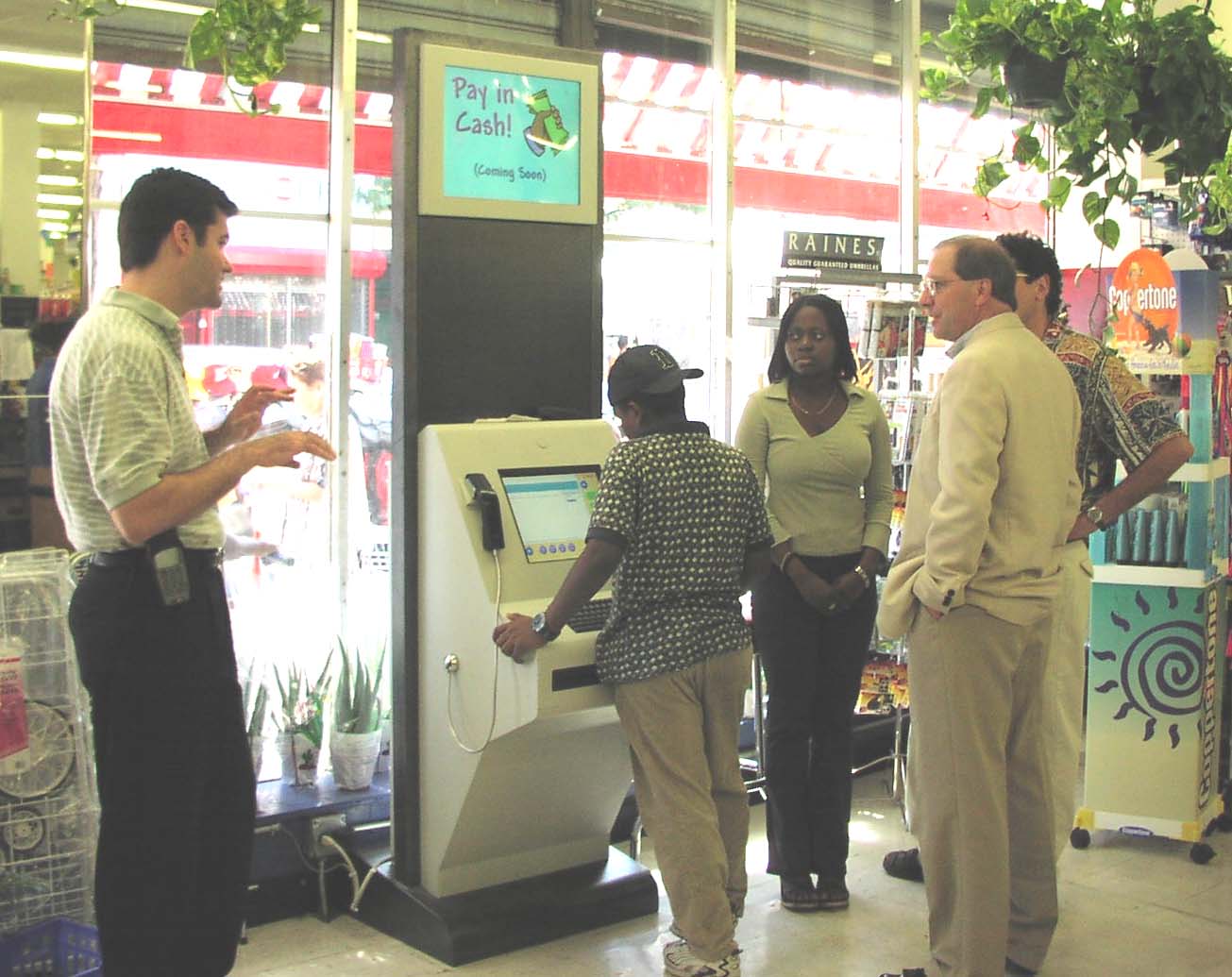Article
Reaching minorities through kiosks
Companies on both coasts ponder the use of kiosks to impact the daily lives of Latino and inner city neighborhoods. While one project is fully committed to kiosks, another project is taking a wait-and-see approach.
February 26, 2002
Growing up in the suburbs in southern California and Colorado, Eric Bobby had a pastoral, middle-class upbringing - the kind local chambers of commerce use when advertising the strength of their communities.
So when Bobby, a 35-year-old graduate of Cornell University with a master's degree from Purdue University's Krannert Business School, first considered ways to bring retail and financial services to the inner city, he lacked cultural experience. He did, however, bring a desire to learn.
"I wasn't that familiar with the inner-city environment," said Bobby, the founder and chief executive officer of CityKi, a technology company focused on the inner city. "It's an experience that takes awhile to get used to, but you grow to appreciate it and get rid of some of the misconceptions."
Bobby started CityKi in August of 2000 after leaving Pricewaterhouse Coopers, where he was a management consultant. During that time, he also was a volunteer consultant for the Initiative for a Competitive Inner City, a Boston-based organization committed to helping inner-city businesses with marketing and control issues.
 |
"I started thinking how can we use technology to access this market," he said. "We can't give away free computers, but how about sharing access."
CityKi launched its first kiosk on July 23, setting up a test program at America's Food Basket, a grocery store in a low-income neighborhood in Dorchester, Mass. The kiosk will eventually offer a variety of services, from financial transactions to retail sales to government outreach. Attracting retailers to the program is crucial, Bobby said, because of the perception that the inner city has nothing to offer potential retailers.
"Right in our back yard is a huge market," he said. "It's not third world, and we can have an impact there."
But while Bobby's company has moved ahead with plans to reach into the inner city with technology, a California-based credit company has taken a wait-and-see approach.
California Capital Companies (CCC) recently won a HOPE (Home Ownership Participation for Everyone) Award for developing a kiosk to deliver real-estate services into southern California Latino neighborhoods. For now, however, the kiosk is a manned - not electronic - center. Company officials, citing technological concerns, have delayed initiating an electronic component to the program.
The two projects, at opposite ends of the country, illustrate the inherent struggles involved in delivering kiosk-based information and services to the Latino and inner-city communities.
The key to the city
Located at the front of America's Food Basket, CityKi's kiosk currently looks like a monolith from 2001: A Space Odyssey with a computer console and telephone attached to the front. A Latino graffiti artist was scheduled to paint the kiosk in late October. Built by Cybertotems and powered by Netkey software, the system cost about $9,000. Bobby hopes to roll out another dozen or so in the Boston area in the next 24 months.
CityKi's kiosk is designed to offer travel, legal, and telecommunications services; retail sales; free e-mail and Internet through services such as Hotmail and America On-Line; and government information. The system will eventually be accessible in as many as seven different languages, Bobby said, including Spanish and Portuguese.
The company has not struck any deals with retailers yet. CityKi spokesman Victor Cruz said Amazon.com, Borders bookstore, and Smart Bargains are the kinds of retailers the company was aiming to include on the site.
 |
CityKi founder Eric Bobby, left, explains the company's kiosk to customers at America's Food Basket in Dorchester, Mass. |
Cruz believes the kiosk will be attractive to retailers because it eliminates the need for brick and mortar locations within the inner city.
"K-Mart wanted to go into Roxbury (Mass.) and tear a lot of buildings down to put up a store and a parking lot," Cruz said. "The inner city is very densely populated, so that's going to be difficult to do."
The kiosk is currently manned from 9 a.m. to 8 p.m. each day. Company employees provide information on the kiosk and help complete financial transactions.
"Our long-term model doesn't have people at every kiosk," Bobby said. "Certainly a number of people will serve a number of kiosks, but it will be more administrative."
The kiosk, which is averaging two to three visitors per hour, will ultimately generate revenue through advertising, transaction fees and partnerships between CityKi and the companies whose services are available on the kiosk.
The privately held company is working to land additional funding. Bobby would not disclose how much funding the company is seeking, but indicated CityKi's rollout plans could be determined by the company's funding level.
"A lot depends on the funding," he said. "We're talking to a lot of potential investors. But in this market, they all want to see proof of concept."
California dreamin'
While CityKi has to convince potential retailers to get involved in the inner city, brothers Alfonso, Alex and Jimmy Espinoza launched CCC to meet the needs of first-time Latino homeowners.
"We know that a house is a pretty high premium in Latino culture," CCC chief executive officer Steve Pontell said. "But it's a high hurdle for an immigrant to walk into a real estate office and say `I want to buy a home.' We decided we needed to go where the customers are."
CCC's centers are located at Cardenas grocery stores in the southern California communities of Fontana and Moreno Valley. The Fontana location, which looks like a bank office, cost about $50,000, while the more low-key Moreno Valley locations was built for $22,000.
Pontell said the locations are responsible for about 10 transactions per month. The company itself does about 200 real estate transactions per month.
The locations have proven a great success as manned stations. The original concept was to create an electronic site, but Pontell said there were concerns over how they would be received.
"The consensus was to create a network within the Latino community to deliver services electronically and with a human presence," Pontell said. "We wanted to use the power and backbone of the Internet to deliver information. But penetration of the community to the Internet is nominal and information about this is pretty low."
As CCC, which is developing a Web site, becomes more sophisticated in the electronic delivery of its products, kiosks could reenter the picture.
"Our next phase will probably be to deliver some keyboard kiosks and link them to our Web site," Pontell said. "We want to give people the chance to learn and experience that technology."
CCC is finding customers without kiosks. CityKi is trying to find customers with a kiosk. Eventually, both companies plan to make kiosks an essential part of the inner city experience.







